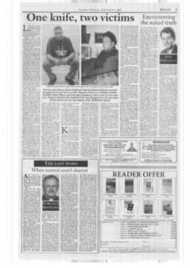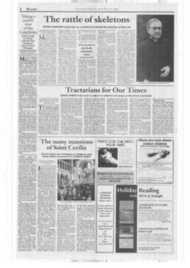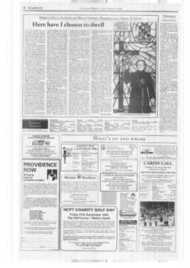Page 6, 9th August 1996
Page 6

Report an error
Noticed an error on this page?If you've noticed an error in this article please click here to report it.
Tags
Share
Related articles
The Slashing And Burning Of Opus Dei
A Family Divided In Two By Opus Dei
Opus Dei Answers Wide Attacks
The'ordinary Catholics Of 134)u •
Bishops Monitored Over Opus Dei Status
The rattle of skeletons
PETER STANFORD is glad that, as a student, he resisted the advances of Opus Dei
Saints and Schemers: Opus Dei and its Paradoxes by Joan Estruch, OUP, £19.50
MY OWN IMAGE of Opus Dei was set in stone 15 years ago when I watched it in operation outside my university's Catholic chaplaincy. Disorientated at being away from the established network of school, parish and home for the first time, I momentarily found the hand of friendship so freely offered by Opus Dei members who loitered in the porch after mass very seductive. Fortunately I am suspicious by nature and quickly settled into more "normal" student pursuits. 1 avoided joining what I later came to regard as tantamount to a religious cult, a judgment made principally on the basis of the damage it did and still does to those who found its offer of a crutch irresistible.
Others, better qualified than me to make judgments, also found Opus Dei's methods of recruiting impressionable youngsters disturbing. At exactly the same time that the organisation was wooing me and my fellow students, Cardinal Basil Flume issued guidelines to stamp out some of the worst abuses the encouragement, for instance, given to members to break links with their families. Later reading about Opus Dei's recently beatified founder, Mgr Escriva, a charlatan if ever there was one, only served to turn doubts into antipathy.
So Joan Estruch, a sociology professor from Barcelona, was facing something of an uphill task in persuading me to think again. But, as the title of his engaging book suggests, he is anxious to present a balanced picture, acknowledging the bad but not overlooking the good.
Many of my prejudices were confirmed. Mgr Escriva, for example, is tried and found guilty of "inconstancy and versality", with his habit of endlessly changing his name to make himself appear grander than he was, just one feature of a disturbed and definitely unsaintlike personality. Though "to hide myself and disappear, so that Jesus alone may shine" was one of his favourite mantras, Escriva had a decidedly messianic twist.
But Estruch also rebuts groundless criticisms that have entered the anti-Opus Dei mythology. At the most basic level Opus Dei is successful in attracting people to Catholicism no mean feat these days and it gives vigorous support to traditional Catholic values.
It has, in other words, managed to be both innovatory in its methods and reactionary in its message. But the innovations do have a distasteful side. The creation of a religious family in the secular world is positive, but its self-image as an elite within a wayward church, plus the excessive secrecy that cloaks all Opus Dei activities, is damaging.
Where Estruch is at his best is in moving beyond the charges and counter-charges (and Opus Dei always has an answer for its critics) and teasing out what it is that makes the organisation misunderstood.
There are three key issues here, he writes. The first is the personality of Escriva and the second the organisation's Spanish roots which continue to shape its outlook. It was founded not in 1928 as Escriva always claimed but in 1936 in an attempt to evangelise intellectuals and middle class people who had previously sided with the Republicans in the Spanish Civil War, and to win them back to the Church and, by association, to Franco. So today, when it claims to be a body of "ordinary Christians", Opus Dei is still denying the essentially bourgeois nature of its membership. Furthermore, when it says it has no interest in politics, it is ignoring the ultra-conservative, Francoist political agenda that is part of its very fabric.
The third area Estruch mentions is Opus Dei's lovehate relationship with the Jesuits. Escriva fancied himself as a latter-day Loyola and wanted Opus Dei to replace the Society of Jesus in the vanguard of Catholicism. Imitation of all but the Jesuits' radical theological and political stance has led to tensions between the two groups, especially in Spain, though Escriva's ambitions have been thwarted.
Saints and Schemers sums up the many paradoxes that characterise Opus Dei. Though the author is admirably even-handed and the text manages to survive a sometimes uneven translation from the original Catalan, this is a book that leaves its readers feeling uneasy that an organisation so close to the heart of the Church and the present Pope should have quite so many skeletons in its cupboard. My closed mind opened briefly, but by the end of this 300-page survey had slammed shut again.
Peter Stanford's latest book, The Devil: A Biography, is published by Heinemann.
blog comments powered by Disqus











